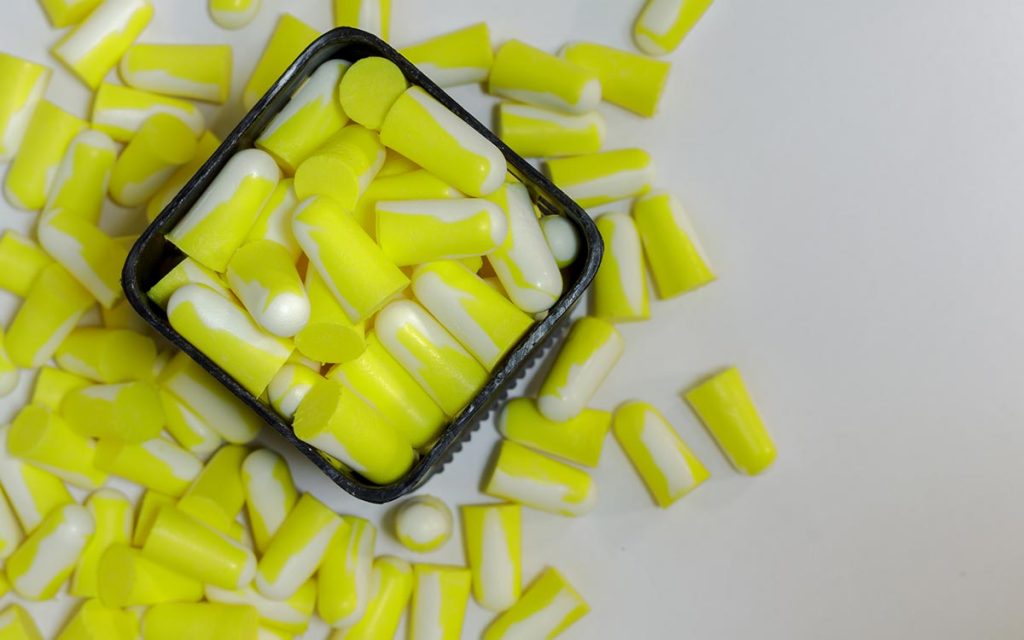Some of our favorite hobbies and entertainment can be destructive to our ears. Damage done over time can keep us from activities that keep us engaged and provide enjoyment. Who would have thought that becoming a skilled hunter could physically cost you? Or snagging those front-row seats in your next concert? While noise is hard to avoid, hearing loss is a hazard that can be cumulative. And some diversions are considered more detrimental than others. Everyday sounds at a safe level are harmless. Those that are too loud for a brief time or longer can damage the ears and cause noise-induced hearing loss (NIHL).
How much noise is too much?
To gauge acceptable levels of noise, it is helpful to understand that sound is measured in units called “decibels.” Exposure to sounds at 70 decibels or below – even at length – is not likely to cause hearing loss. However, repeated exposure to 85 decibels or louder can be destructive, bringing you audibly closer to NIHL. Normal conversation is measured between 60-70 decibels, while music (through headphones, at max volume, events or concerts) falls between 94-110.
With fireworks and gunshots ranging from 140-170 decibels, one can begin to understand the vulnerability of certain avocations. A series of events and intricacies of the inner ear absorb the impact, and in short, most NIHL is caused by the damage and death of hair cells that do not regenerate. Extremely loud sounds like fireworks or explosions can also harm the eardrum or the bones in the middle ear, causing instant permanent hearing loss.
NIHL can affect people of any age as it is caused by exposure to intense one-time “impulse” sounds (shooting) or to loud noise over time (such as going to concerts). That said, it is not surprising that certain recreational activities can increase the odds of getting NIHL, including shooting targets, hunting, being part of a band, or attending high-volume performances.
Noise-induced hearing loss is preventable
The ideal is to avoid hearing loss. And the good news is that NIHL is preventable by being alert and attentive to hazardous environments and high decibels. Wearing earplugs and protective devices is also important. This is especially true for younger children who may not think of this on their own. But what if you already deal with hearing loss? Can you still enjoy those high-decibel hobbies that you enjoy? And how can you protect the hearing you have left? There is good news on all fronts as custom hearing protection and other tools are now available for hunters, musicians, and music lovers.
How to protect your ears
- Earbuds – While foam earplugs are better than nothing, they often muffle sounds by reducing the higher frequencies. There are earplugs for musicians and groupies that reduce all frequencies. This retains the sound you want to hear while offering volume protection. For example, high-fidelity earplugs minimize noise and allow a more stable seal. Some have acoustic technology that leverages comfort.
- In-ear monitors (IEM) are a step up from generic earbuds and you can get them custom fit. Molding to your ears, they electronically filter noise and isolate sound. The digital versions are compatible with most audio devices. Plus you can fine-tune an audio mix or provide additional definition by distributing sound from specific instruments (drums, vocals, etc.). More good news: you’ll hear less of the crowd.
- Decibel meters – or Sound level meters (SLM), as they’re sometimes called, measure sound levels by calculating the pressure of sound waves. Widely available and affordable, these compact devices are handheld with a microphone that can pick up noise.
- Shooter plugs – Non-digital and digital, these are made for shooting environments. Non-digital work best where a low number of shots are fired. Filters enhance sound for awareness of game and dog tracking while allowing easier communication between hunting partners. The digital variety not only customizes the fit but feature advanced electronic hearing protection for peak performance including wind and noise suppression. There are even separate modes for game and clay.
Before you fire your next shot or take in a show, know you can filter the sound for your experience.
